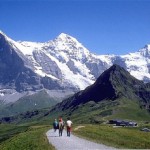-
A Journey to the Haba’ib of Yemen
By Anon.
Categories : Miscellaneous
Bism Illah Al-Rahman Al-Raheem
For two years, my most dominant thought was traveling to and being with the grand shaykhs and saliheen I had heard so much about. Without a doubt, not one day passed without me thinking about it. Al hamdulilah, in the momentous summer of 2000, it finally happened. As an act of gratitude, I would like to give a first-hand account of that experience, along with some helpful tips, for those hopeful aspirants who have yet to journey themselves. I know how it feels.
For every journey, there are two journeys.
In March of 2000 I was a junior in college and I realized that my religious condition was spiraling out of control. Something had to be done. I began to discuss seriously with my parents about going to Yemen in the summer break. This is an important note. If one is serious about something, they must plan ahead, many months ahead. The previous year I made no plans and just expected that I would go somewhere. However, when the summer came I found myself flat-footed…not enough time, and the endeavor failed. I learned my lesson, and to show Allah that I really wanted this I was going to attack the asbab, giving myself ample time, armed with diligence and patience.
By mid-May I had made considerable strides. Most importantly, I received what I call “al visa al kubra”—“the grand visa,” also known as permission from the parents. So I relaxed thinking that it was just a matter of time. But like I said, I was slipping. Sometimes when your iman goes down, everything comes down with it. Due to my recent idiosyncracies, I barely got permission.
However, the very next day this rosy picture would take a detour—a vicious detour. I called home asking if they wanted something on my rather long commute home from my early morning summer classes. I had been up late the previous night so my mom said, “Sleep, then come home.” I refused. I was too excited thinking about Hadramawt. Then again they tried to persuade me, “rest first so you can drive.” Nope. My mind was like a stubborn lock. Five minutes from home I fell asleep at the wheel. At forty miles per hour, I was awakened by the hideous sound of steal crunching steal. It was a red light and I slammed into the car in front of me. There was an infant in that car.
It didn’t take 15 minutes before the Hadramawt trip was swept off the table. This is why I say that there are two journeys for every journey. If you want to travel in the way of Allah, be ready for the most unfathomable, gut-wrenching, nerve-wracking adversity of your entire life. Those who’ve gone before understand what I mean. Everybody is at their respective level, and to me, that was the most devastating day of my life, and it was my fault. I walked upstairs staring at the prospect of falling and ultimately drowning in the indomitable pit—al nafs al ammara. At this point, I had no self-discipline and my nafs was like a python around my neck.
But the moment I hit the nadir of despair, I realized…I was putting all my faith in the asbab. Allah will cure your heart, not Hadramawt. He might use Hadramawt, but with all due respect, Hadramawt has no intrinsic benefits to offer. That’s what I was left with, nothing but Allah. And the moment I realized that, it was as if a Divine breeze swept over my heart.
This is another stage—when Allah tries your inner most mettle with trials the likes of which you’ve never seen before. I told one brother this story and asked, “Why is it that in my most desperate moments I feel the sweetest peace?” He said, “Because it is at that moment that you enter into complete slave-hood to Allah.”
Dua with desperation is the key to making these journeys happen, and best at tahajjud time. What I learned is that you should go for the asbab only as testimony to Allah of your sincerity, but you will never get there by them. It is as if when Allah sees your sincerity, He wipes out the asbab and gets you there Himself. My 5 months planning exploded right in my face in less than a minute. In the interest of time, the reader should just understand that the means resemble the ends. I sincerely believe that the more blessed the journey, the more arduous the getting there. I once got to Egypt with like 10 days planning and not an ounce of difficulty. But I got there and just ate and watched the Umm Kalsoom soap opera (an Egyptian singer). Too bad for the name.
Now for Yemen…
“Hadha zayn lak.”
Alhamdulilah, my parents saw the 100% change that took place in me after the accident and allowed me to go. I was thankful to Allah.
Physically getting to Yemen is easy. You can get a cheap flight to Sanaa, the capitol. The airport is tiny, smaller than an A & P food market. Next to the prayer area there, I got into the phone booth and called Izbet al Mustafa. The Haba’ib have a house in Sanaa for people traveling through, like me. A brother picked me up. I had informed them a day before, but either way is fine, the city is small relative to US cities. I spent a day there to rest. The school, Dar al Mustafa, is south of Sanaa in Tarim. You can take a 10-hour bus trip (air conditioned w/corny Arab movies) or a $120 flight to Seyoun, where you’d call the Dar and a taxi will come for you. If you can get around in NY, LA, St. Louis, or any of these cities, you don’t need to worry about Yemen. They say if Adam peace be upon him would return to the Earth, the only place he’d recognize would be Yemen because it hasn’t changed.
What happened on the first day I took as a good omen. On the way to Dar al Mustafa, my guide had a delivery for Habeeb Mashur, Habeeb Omar’s older brother. So I waited outside while he took care of that. Then someone signaled me to go in, which I did. The Shaykh offered us breakfast and we ate together. My guide then said to me, “This rarely ever happens. This is a very special moment.”
Dar al Mustafa is nice and the scenery is just as I imagined and more. It is a building of orangy stones, with some parts roofless. Its two levels are comprised of student rooms, a kitchen, a tiny store, and the prayer hall. There is even a swimming pool across the road. Goats and chickens run around the village; houses are of mud brick. I would quickly learn that getting there is an end that is in reality another beginning. There’s the physical effort and the spiritual struggle. But this time it’s different. There is a sense of security because you’ve finally made it and these people can help. At least you don’t have to lower your gaze in Tarim.
When a student arrives he’s tested rather informally. One of the things I found interesting was that the Shaykh asked if my father approved of the trip. I realized right away how much elders are respected; parents are near sacred. There are many teachers who can give you perhaps 30 minutes per day, and it’s pretty relaxed. I just asked a teacher and they gave me a time slot. I had 4 classes per day, then upped it to 9 per day, 5.5 days a week. One of the students helped arrange my day’s routine.
At around 4am you are roused from sleep: tahajjud. Then the Ninety-Nine Beatific Names are recited. That was my favorite. Oh yeah, before and after every prayer theawrad are recited over the PA system. That was neat because you got to nearly memorize them by the end of the trip without ever trying. I mean, I’m just using simple adjectives here, but the reality is that I cannot fully comprehend the profundity of that city and those people. After fajr the classes begin and go up to 9am. That’s breakfast time and usually sleep follows that until dhuhr adhan. Sometimes a group jog is organized. After dhuhr is slow due to the heat. Lunch is served and you have some free time for study, private classes, or whatever. Asr is called and following that is the Rawha—readings from the Ihya with Habeeb Omar. Pretty much, it doesn’t get any finer than that. Mondays we sang the Burda and Fridays there was khitaba, practicing Jumua Khutba. Again a short break is given before Maghrib. I utilized this time for walks in the village. There is something deeply human about walking along a route which is absolutely free of anything synthetic. All you hear is the crunching of your feet against the dirt path. Can you imagine that? I can hear it now. Once I hiked up a large hill. Another time, I visited a goat farm and fed billy-goats. This is a beautiful trait of Tarim. No matter what level of knowledge or certainty you’re at, you can fit in. I enjoyed the simplicity and quiet. Classes resume until Isha, which is followed by review of what you learned, dinner, and that’s it. That is a day at Dar al Mustafa. Visiting students can abate the schedule if too intense.
These journeys are purificatory. When in a good environment, ones’ diseases and ignorance become starkly apparent. So when you’re there you think, “Boy, I am seriously dysfunctional. This is scary. I better do something.” Also, shaytan works extra to distract you with was-wasa and what not. Most newcomers get a little sick. I personally got very ill in the last week and actually thought I was going to die. Insha Allah the illness is purification and not punishment. One of the good things about getting sick is that all the shuyukh come visit you, especially if you’re a visitor from a far away place. In regards to the shuyukh…I recommend two things: 1) have adab of course and 2) have some audacity. Not rude audacity, but just don’t be shy. For me, I thought to myself, “I might never come here again,” and it was as if an impulse picked me up and took me to Habeeb Ali’s or Habeeb Omar’s. I just went to their houses. You must initiate intimate conversation. Think about it; it could be a once in a lifetime chance. By audacity I mean express yourself. There’s a hadith saying that if you love someone, tell them. By doing so and by giving them gifts, they’ll remember you and in turn love you back. It is more important that the shaykh love the student than that the student love the shaykh. Back to being sick…it’s almost inevitable and it’s all in the way of Allah. Habeeb Omar, when I was sick, told me, “Hadha zayn lak”—“This is good for you.” Tahooran insha Allah.
I believe that Dar al Mustafa will be a school of choice for future Western Muslims. It combines the remoteness of Mauritania with the amenability of Damascus, meaning that it is not too difficult to live there. I mean, all the places are praiseworthy, I’m just noting a quality that I found there. The Westerners have a committee to help new students and visitors and insha Allah an English program will be arranged for non-Arab speakers to learn Arabic from scratch. Another great quality is Dar al Zahra, which is a school for sisters being built just across the road. There are many other surprises and secrets about Tarim, but I wont disclose them all. You’ll have to see for yourself.
I have used my story as a lead for telling about Hadramawt and to give some tips on making these trips happen. Our communities will grow immensely if every year one or two people travel to a place like this. Your iman increases and you give off vibes to be absorbed by those around you. Thank you for bearing with this long essay. Barak Allah fikum, wassalam alaikum.





